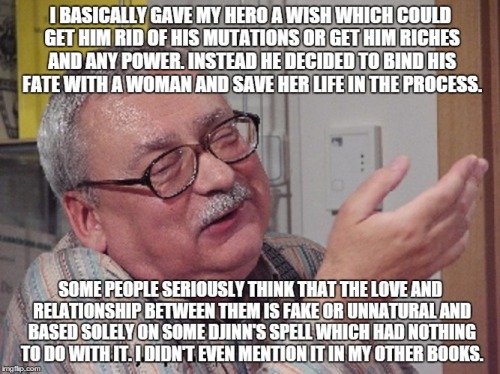Corewolf;n8050920 said:Well I did have a thought driving home.
Timeline:
Djinn influence
Geralt sleeps with Yen, vanishes, she gets mad, eventually forgives
Yen sleeps with Istredd, Getalt is hurt, Yen runs, Geralt eventually forgives
Lots of relationship stuff in the books. Sleeping with Fringilla, all forgiven
Death/near death. Avalon, Wild hunt, amnesia.
Geralt sleeps all the kinds of around. Yen, non-amnesiac, knows about it. Ignores Geralt for all of 1 and 2.
Beginning of 3. KNOWING he has slept around (particularly with Triss in 2) sends a note with a PM going "I still have the unicorn" (Read. LETS BANG!) Which always struck me as odd considering that she hadn't talked to him at all since his amnesia. So she knows all about his sleeping about and just goes "Hey, remember that thing we had sex on? I still have it *wink*" After, you know, not talking to him or trying to find him (as Geralt points out)
Forgives him for all the infidelity. If you sleep with Keria and the others, forgives all that so long as you DON'T sleep with Triss.
Only opportunity to actually do anything with Yen is if you then free yourselves from the Djinn's influence.
Do THAT and if you sleep with Triss in the course of the game... Yen gets mad... and doesn't forgive.
So.. why forgive all the times before you do the quest "The Last Wish?"
Remove Djinn influence... Cute anger at missteps in relationship with no forgiving
Because Magic is pushing them together and making it easier for her? But if you break the spell she can go "Geralt of Rivia is someone that we have decided doesn't matter to either of us anymore"
Even Triss's interest could be said to be influenced by the Djinn. Her pining for Geralt could have put strain on Yen and Geralt's relationship; and only one of the relationships can survive the breaking of the spell. If you hurt both of them after that, neither can stand you because nothing is encouraging them to forgive beyond normal emotions.
It's a possibility anyway.
You are mixing game story to the book story. As others said Last Wish quest was written by CDPR for players to break or continue with Yennefer. How is your theory working if players chose Yennefer though? How they are loving each other even without Djinn magic then? How Yennefer still loves Geralt even after he broke her heart in this quest? You said that you are TeamTriss and I kinda understand why you think that Yen/Geralt is heavily influenced by Djinn so you can say that Geralt never really purely loved Yennefer and feel better about your romance choice in the game. Triss in the books isn't so important to Geralt so only way how to feel better about this is diminish Yen/Geralt love story, and saying it was all because of Djinn. I have no other explanation, because as Samiel27 wrote, Sapkowski never really questioned the love of Yen/Geralt, he said many times he wrote difficult Yennefer directly for Geralt so he can grow as character, at the end of the saga both characters got an ending and their very last words in the saga were about their love.
He did also write in things like Geralt x Fringilla and Geralt x Little Eye. Not saying that the feelings between Yen and Geralt are "fake" just heavily influenced by magic and that they are no more "soul mates" than anyone else is
Are you really comparing Fringilla and Essi to Yen/Geralt scenes? Hmm Fringi/Geralt or Lytta/Geralt romantic scenes (Essi scene wasn't even written) weren't poetic at all if you compare them with Yen/Geralt scenes they were written so differently on purpose. But if you didn't notice that reading all of the Witcher saga books it is hard to explain then.
Last edited:




